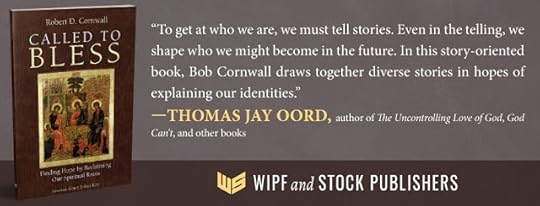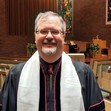Called to Bless: Finding Hope By Reclaiming Our Spiritual Roots - A Path of Spiritual Reconstruction


In 2021, my book Called to Bless was published. It is in essence a theological memoir that offers a path for those who have experienced spiritual deconstruction and wonder what is next. Many leave Christianity, but is it possible to reclaim parts of one's past experiences, such that something new can emerge. My own spiritual journey has taken me to several places from Episcopal to Disciples of Christ, each stop has left a bit of spiritual DNA that helped form the person who exists today. My hope is that what I've discovered can help others along their journey.
I am grateful to Grace Ji-Sun Kim for writing the foreword to the book. She commends the book and its author (me), as it "generously shares his life journey of seeking the divine, encountering the Spirit, and living into the Spirit. Cornwall explores spirituality with honesty and reflective sensitivity, asking us what it means to not only encounter the Spirit but what it means to live being filled with the Spirit."
If you want to hear more about the book, I invite you to check out Brian Kaylor's interview concerning the book for Dangerous Dogma.
With that in mind, my publisher (Wipf and Stock) is offering a 40% discount on the book. To order a copy, go to the book page at: https://wipfandstock.com/9781725268685/called-to-bless/ Please use the coupon code: CALLEDTOBLESSCORNWALL.
*************
Below is an excerpt from the book, along with endorsements for the book.
I am who I am, spiritually, because of the spiritual DNA Icarry. My journey has been a circuitous one. I have traveled from the church ofmy birth, the Episcopal Church, to the Christian Church (Disciples of Christ),the church of my mature years. Along the way, I’ve been part of several otherfaith communities, including Pentecostals, Baptists, Presbyterians, and theEvangelical Covenant Church. My theology is eclectic. I’ve suggested thiseclecticism is due to my being a historical theologian rather than a systematicone. My theology professor in seminary, Colin Brown, reinforced the idea thatthere is no one system of theology, which is why we didn’t have a specifictextbook. Over the years, I’ve borrowed from Karl Barth, Jürgen Moltmann,Dietrich Bonhoeffer, Jon Sobrino, Elizabeth Johnson, Athanasius, theCappadocians, Augustine, John Calvin, Open Theists, and many more. I know thatthese can be strange bedfellows (think of Calvin and Augustine alongside TomOord), but I’ve come to believe that few of us are theological purists. Anotherway of describing my journey is to use the word “pilgrim.” Diana Butler Basswrites that “becoming a pilgrim means becoming a local who adopts a new placeand new identity by learning a new language and new rhythms and practices.Unlike the tourist, a pilgrim’s goal is not to escape life, but to embrace itmore deeply, to be transformed wholly as a person, with new ways of being incommunity and new hopes for the world.”
It is said by some that we should live in the present. Thatis true, but it’s important to remember that the present only exists for amoment before it becomes the past. As for the future, it is always beckoning usforward. Jürgen Moltmann reminds us, “Original and true Christianity is amovement of hope in this world, which is often so arrogant and yet sodespairing. That also makes it a movement of healing for sick souls and bodies.And not least, it is a movement of liberation for life, in opposition to theviolence which oppresses the people.” Whatever spiritual DNA we draw from thesefounding visions, if it’s true to the calling given to Abraham and hisdescendants, then it will be a vision of hope, healing, and liberation. Thus,it will be a call to bless.
What is true of us as individuals is also true forcongregations. Congregations are formed by people who bring their variousspiritual journeys and life experiences into the community. Some participantsgrow up in the church and others do not. Some spend their entire lives in onetradition, while others have been wanderers (much like Abraham, the wanderingAramean, who is the father of Israel). When we gather together as a community,or better yet, as siblings in the family of God, we contribute our diversespiritual DNA into the church’s existence. This contributes to the diversityand complexity of the congregation, even one steeped in a particular tradition.The members/participants in a congregation contribute their spiritual DNA, butso does the Tradition of which they are part.
So, for example, consider my denomination, the ChristianChurch (Disciples of Christ). Contributors to our identity as a movement anddenomination include the Presbyterian heritage of the Disciples founders. Italso includes the time spent by the Campbellites among the Baptists. They drewfrom the Reformation, along with the British Enlightenment (John Locke, forexample). Then there is the secular DNA contributed by their American context.The movement emerged shortly after the birth of the new nation. Thomas Campbellcontributed a founding document to the movement that he titled The Declarationand Address. The word “Declaration” was used purposely as a signal that thiswas a revolutionary document. Sometimes we Disciples see ourselves as part ofthe Reformed tradition, but if so, we aren’t an “orthodox” version of thattradition. The founders purposely threw off the creeds and faith statementsprized by their Presbyterian colleagues and ancestors.
If we take this a step further, individual believers and thecongregations of which they are members contribute their spiritual DNA to thelarger church, making the Christian “religion” a rather complex organism. Inour diversity and complexity, we find our purpose as a community in that callgiven to Abraham and Sarah. Their call is our founding vision, one that wasembodied and renewed and passed on to us in Christ Jesus. That calling, whichrequired them to leave their homes and set out for an unknown land, eventuatedin a fountain of descendants, who are called to be a blessing to the nations.It is a calling that has been passed on from generation to generation until itincorporated we the readers of this book, whether Jew or gentile, for all of usare heirs of this call to be a blessing to humanity and all of creation. Whilethe future might be open, might we envision that moment when all things cometogether, and the blessings promised to Abraham and Sarah reach theirfulfillment?
I did not see a temple in the city, because the Lord GodAlmighty and the Lamb are its temple. The city does not need the sun or themoon to shine on it, for the glory of God gives it light, and the Lamb is itslamp. The nations will walk by its light, and the kings of the earth will bringtheir splendor into it. On no day will its gates ever be shut, for there willbe no night there. The glory and honor of the nations will be brought into it.(Rev 21:22–26, NIV)
Praise for Called To Bless
“What does a Bapti-costal, Episco-matic, Presby-vangelical,Disciple of Christ, and Covenanted Follower of Jesus look or sound like?Perhaps a child of Abraham who has inherited the divine mandate of being ablessing to others, even indeed to the ends of the earth. Anyone seeking tomake sense of their varied spiritual journey will find Robert Cornwall a sureguide and companion.”—Amos Yong, Professor of Theology and Mission, Fuller TheologicalSeminary“To get at who we are, we must tell stories. Even in thetelling, we shape who we might become in the future. In this story-orientedbook, Bob Cornwall draws together diverse stories in hopes of explaining ouridentities. Cornwall’s narration is worth the listening!”—Thomas Jay Oord, author of The Uncontrolling Love of God, GodCan’t, and other books“This is an insightful book, designed for people who want toexamine and explore their faith. It is written by one of the most perceptivepastoral theologians of our time, whose work makes us think deeply about ideasof tradition and continuity of faith in the modern world. It is also a bookwhich draws Christians together rather than divides or separates.”—William Gibson, Professor of Ecclesiastical History and Director of theOxford Centre for Methodism and Church History, Oxford Brookes University,United Kingdom“Bob Cornwall asks, ‘Who am I? Where do I come from? Wheream I going? What is my purpose in life?’ Such questions are entrenched in theearly twenty-first century. Cornwall points to Abram and Sarai as foreparentswho were given the gracious call from God to show the way of blessing toothers. By demonstrating the way of blessing, the couple would be blessed. Twothings happen. (1) The number of paths to blessing expands as human experiencebecomes more diverse. (2) Communities lose blessing as life wears them down.Cornwall shows readers how to rediscover the generative power of the foundingblessing and to witness to blessing in new forms in new contexts.”—Ronald J. Allen, Professor of Gospels and Letters, Emeritus, ChristianTheological Seminary, Indianapolis“This book provides a theologically informed case study,based on the author’s life experiences, that is intended to show individualChristians, pastors, church leaders, and congregations how to find a fruitfulbalance between their past traditions and their Christian witness for thefuture while living faithfully in the present. Reflection questions forindividuals and congregations following each chapter are designed to helpreaders as they respond to this challenge.”—Keith Watkins, Professor Emeritus of Practical Parish Ministry,Christian Theological Seminary, Indianapolis



